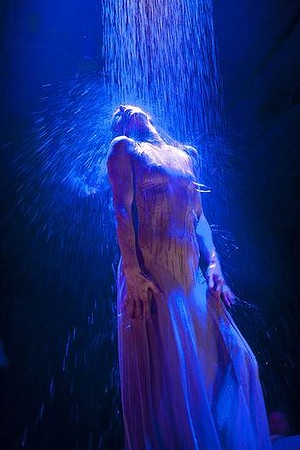This morning The Canberra Times published my review of Finucane & Smith’s burlesque extravaganza, Glory Box. As the review is not available online I am posting a slightly revised version here. I have to admit to being taken unawares at what the show had to offer. Some items were better than others; I found some superficial. But then on reflection that’s not surprising—much of what burlesque parodies is superficial or at least only titillating. As a whole, however, the show was a more than interesting night out.
28 November 2012, The Street Theatre, Canberra
From Pina Bausch to the Rocky Horror Show, from Mardi Gras to Butoh, Bollywood to the Lido, Glory Box has it all. Erotic, brash, exhibitionist, scandalous perhaps and definitely loud (earplugs needed sometimes), it throws its subversive message out to the audience from a stage space decorated with a myriad of Chinese red paper lanterns and set up to resemble a nightclub.
The show opened with the most overtly and superficially sexual offerings, a ‘male strip’ called Romeo with a surprise ending, Strawberry with the performer offering selected members of the audience a mouth to mouth strawberry, which she first extracted from close to her bosom (and elsewhere), and Everyone wins a prize when Paul Cordeiro, the sole male member of the five person troupe, gyrated around the stage and threw stuffed animals, unpinned from his briefs, into the auditorium. But from there it picked up theatrically and became less sexually blatant but more powerful, without losing any of its confronting features.
I was impressed with Anna Lumb and her circus acts, especially her trapeze sequence, hard enough as it is without it being done in the highest of stiletto heels, and her hula-hoop act (how many did she have in the end); and with Maude Davey who gave a powerful performance in Glory wearing nothing but a headdress of antlers and a bleeding heart. I was fascinated by Holly Durant’s Salome, which began reminding me of experiments made at the Folies Bergere in the early years of the twentieth century with lighting and swathes of fabric—Loïe Fuller’s activities for example—but which ended as a reference to the famous/infamous ‘Dance of the Seven Veils’.
My personal favourite though was Miss Finucane’s Collaboration with the National Gallery of Victoria (Get Wet for Art) spoken, acted, danced, expressed by Moira Finucane to Prince’s Purple Rain. Eat your heart out followers and admirers of Pina Bausch. Here was German expressionist angst rendered sardonic. Finucane left the stage sodden, her flimsy, ankle-length dress clinging to her body. Unbelievably and irresistibly Bauschian. Finucane is a very strong performer who, once onstage, is impossible to ignore and her text about gallery visiting was entertainingly mocking while being delivered with the utmost seriousness.

A handful of people left during the first half and another handful did not return after interval. I’m not sure if they were affronted by the full frontal nudity, the full-on sound, or something else. But it was a shame really because the show is much more than the sum of its individual parts and the second half probably contained the strongest moments. Definitely not for the faint-hearted, but certainly an unexpectedly fulfilling evening that was ultimately surprising in its underlying powerful and emotive comment on sexuality, society and theatrical modes of expression. In any case it was worth everything to see the Street Theatre alive during the finale with a dancing ovation from the audience.
Michelle Potter, 30 November 2012
There is no secret code that dancers have that others don’t. This is a common misapprehension among the non-dance going public. Dance is simply a theatre form like all others.
I would have thought that in a review, especially when one has a limited word count to keep in mind, that it is not necessary to elaborate in minute detail about every point. I think one has to have some respect for one’s readers and expect that they can analyse and extract from what is written. At the beginning of my review I mentioned a number of theatrical modes of expression and I expected that most readers who have some theatrical knowledge would have realised that this was the clue to my comment on the evening’s ‘underlying powerful and emotive comment on sexuality, society and theatrical modes of expression’.